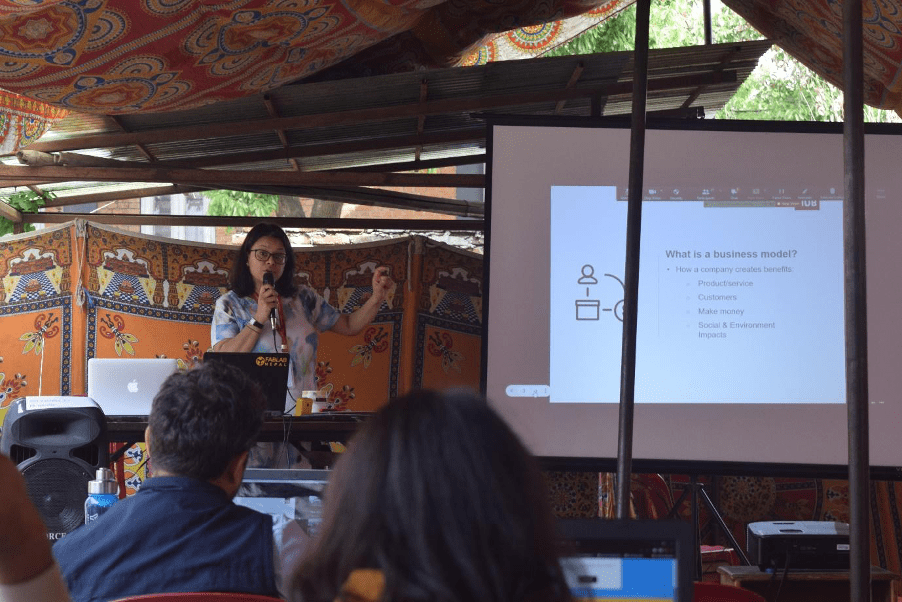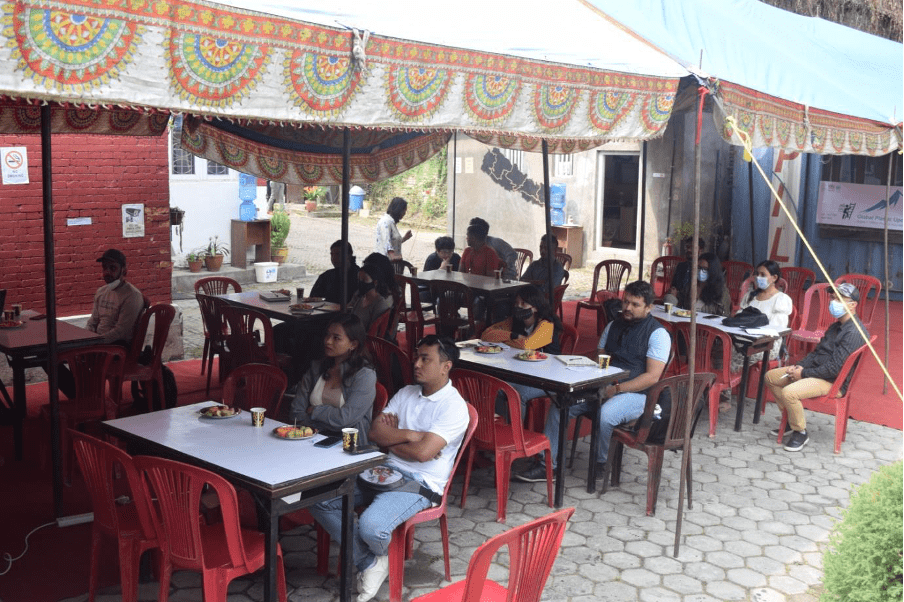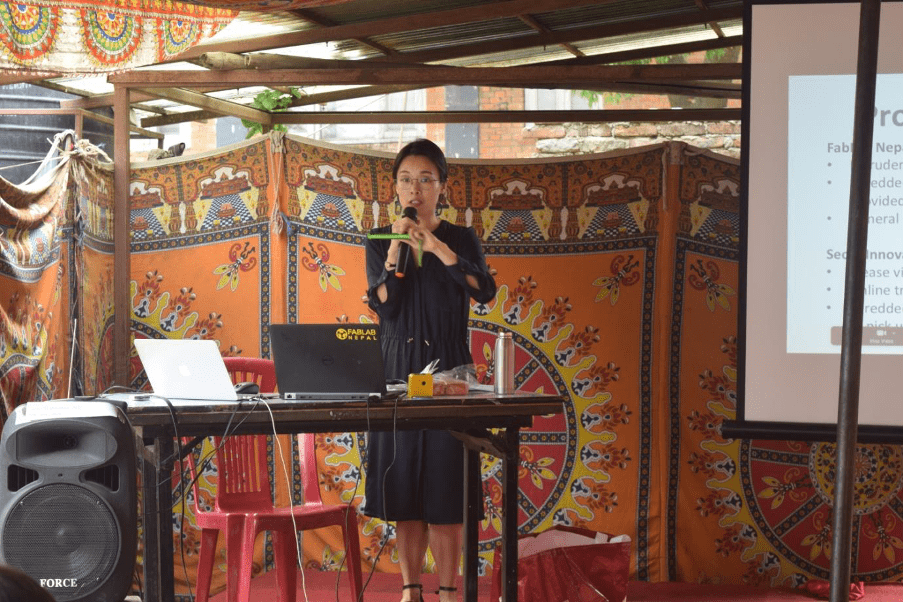
Impact Hub Kathmandu is thrilled to announce an exciting new partnership with the University of Cambridge – Center for Industrial Sustainability, Field Ready and Sustainable Manufacturing & Environmental Pollution (SMEP) to introduce the project ‘Plastic Waste Remanufacturing for Local Housing: Innovation Ecosystem in Nepal’. This project is funded by SMEP and UKaid and will be implemented at FabLab Nepal The University of Cambridge-Center for Industrial Sustainability, the UK is the project leader, and Field Ready, UK, and Impact Hub Kathmandu are the consortium partners.
The project aims to improve the living conditions of local residents in Nepal by transforming plastic waste into useful housing products for the locals and for the locals. 4900 tonnes of solid waste is generated by urban Nepal every single day and 600 tonnes/day of plastic waste is piling in streets and mountains in Nepal as per the World Bank report on Strategic assessment of solid waste management services and systems in Nepal 2020. The lack of waste management system disincentives recycling efforts resulting in plastic commonly being burnt in the open air causing serious air pollution. The SMEP Plastic Waste Remanufacturing Project will work towards upcycling the plastic waste collected from rural and urban areas of Nepal by converting it into functional shelter homes and construction materials to combat plastic pollution.


To assess the needs of the community and understand plastic pollution from the ground level our team held a consultation stakeholder meeting at Fablab Nepal and visited the most flood-affected areas in Sindhupalchowk in March 2022. We also invited locally active organizations in the sector of environmental conservation, plastic recycling, and solid waste management to discuss the agenda. We spoke to organizations such as Clean Up Nepal, Green Decisions and Research, Doko Recyclers, Upcycle Nepal, and Green Road Garbage Management Pvt. Ltd, Himalayan Life Plastics, Wildlife Conservation Nepal, Zero, Dharmen Singh of Handicraft/Jewellery House, Petal Construction Pvt. Ltd, World Vision International, Nepal Academy of Science and Technology (NAST), UNDP Nepal, Pipe-making-Pokhara. Consulting with these active organizations in the ecosystem, we heard the urgency to address the plastic pollution challenge. High transportation costs of plastic upcycling necessitate, a lack of waste segregation at sources, MLP(Multi-Layered Plastics) Pollution, informal sector, tight control of the plastic collection supply chain, etc are causing serious hindrances in the recycling process. The quantity of rigid plastic is high, and there is a major problem with plastic supply, supply chain, pricing modalities, segregation, education, resources, product innovation, and problem-solving and engaging the existing private waste collector sector is difficult.
“Waste segregation, taxes, access, and value chain information appear to be problematic in Nepal.” Amod Karmacharya from Clean up Nepal.
During the meeting, our stakeholders came up with concepts of a plastic road and a plastic block as proposed solutions and showed a willingness to offer technical operational insights into the project. Construction industry players were also enthusiastic about the concept to address solid waste challenges.


After validation from the respective communities and stakeholders, we organized a 4-day Global Plastic Upcycle Makeathon where we openly invited makers to bring their thoughts and ideate creative solutions around plastic upcycling to innovate construction materials for shelter homes. Seven teams participated in the event including teams from Korea, Bangladesh, and Srilanka who joined virtually and came up with innovative upcycling ideas such as wall insulation, roof, floor tiles, and pipe insulation alternatives. The purpose of this Makeathon was to convert these brilliant ideas into a tangible prototype for plastic upcycling for household construction products and convert it into a sustainable business model.

As a result of the MAKEathons in 2022, solid ideas from the event will now be taken forward into the business incubation program phase. The innovation startup cohorts will be given intense training, guidance, support, and resources to settle as successful MSMEs (Micro, Small, and Medium-sized Enterprises) throughout 2023 and 2024. The entire focus of the project is to build entrepreneurial capacity for the cohorts to improve the livelihood of the locals by revalorizing the plastic waste from disposal into useful, long-life, essential products. In parallel, we will create an innovation process protocol and open-sourced plastic remanufacturing manual to help the locals and other SMEP region stakeholders to implement our know-how and knowledge suited for their context and create meaningful and impactful jobs.

It has been a miraculous journey from the project proposal writing to the execution of the MAKEathon with exceptionally great, talented, and warm-hearted people. The project could not be better. We are very hopeful and confident for phase two and phase three of the project. There we will be able to realize the potential impact we have created, which was conceived from phase one. Curie Park, Project Lead, SMEP
Through the project, we will empower aspiring local entrepreneurs and innovators by providing equipment, resources, know-how and collaboration momentum, and business incubation training. This would support those who normally lack access to innovation opportunities due to the adverse terrain conditions to travel and transport in Nepal. Through running innovation events, incubating start-ups, and franchising small-scale remanufacturing units across Nepal, we will enable short-distance, affordable, self-sufficient plastic waste remanufacturing production lines in multiple locations. The plastic waste collected from rural and urban areas of Nepal will be upcycled into functional shelter homes to combat plastic pollution which promotes the material replacement and development of biodegradation alternatives in Nepal.
We trust our endeavors will contribute to mitigating the severe plastic waste issues in Nepal while improving the living and financial conditions in Nepal, eventually addressing the climate crisis issue. Why not join our impact journey today?

Special thanks to our partners: Field Ready, University of Cambridge, Centre for Industrial Sustainability, Seoul Innovation, FabLab, and Korea University.


